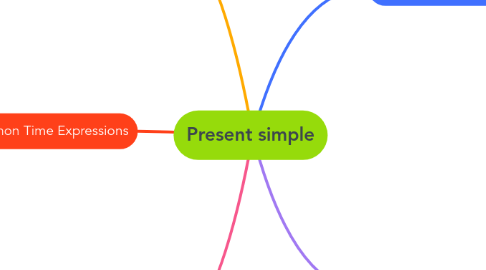
1. 5. Activities for Practice
1.1. - Fill-in-the-blank exercises: Complete sentences using the correct form of the verb.
1.2. - Sentence transformation: Change affirmative sentences to negative and interrogative forms.
1.3. - Role-plays and dialogues: Practice speaking in pairs or groups.
1.4. - Writing assignments: Write a paragraph about daily routines or general truths.
2. 4. Common Time Expressions
2.1. These expressions often accompany the simple present tense to indicate frequency:
2.1.1. - Always: "She always arrives early."
2.1.2. - Usually: "They usually eat dinner at 7 PM."
2.1.3. - Often: "He often reads before bed."
2.1.4. - Sometimes: "We sometimes go to the movies."
2.1.5. - Rarely: "She rarely eats fast food."
2.1.6. - Never: "He never smokes."
3. 3. Third-Person Singular Rules
3.1. When the subject is he, she, or it, the verb typically ends in -s or -es:
3.1.1. - Regular verbs: Add -s. - Example: "He plays soccer."
3.1.2. - Verbs ending in -s, -sh, -ch, -x, or -o: Add -es. - Examples: "She watches TV." "He goes to school."
3.1.3. - Verbs ending in a consonant + y: Change -y to -ies. - Example: "He flies a plane."
4. 1.Definition and Usage: The simple present tense is used to describe:
4.1. - Habits or routines: Actions that happen regularly. - Example: "She reads the newspaper every morning."
4.2. - General truths: Facts or statements that are always true. - Example: "Water boils at 100 degrees Celsius."
4.3. - Scheduled events: Future events that are part of a timetable. - Example: "The train leaves at 9 PM."
4.4. - Permanent situations: Situations that are generally true for a long time. - Example: "He lives in New York."
4.5. - Feelings and emotions: States of being and sensory perceptions. - Example: "I love chocolate."
5. 2. Forming the Simple Present Tense
5.1. #### Affirmative Sentences:
5.1.1. - Structure: Subject + base form of the verb (add -s or -es for third-person singular). - Examples: - "I work at a bank." - "She works at a bank."
5.2. #### Negative Sentences:
5.2.1. - Structure: Subject + do/does not + base form of the verb. - Examples: - "I do not (don’t) play tennis." - "He does not (doesn’t) play tennis."
5.3. #### Interrogative Sentences:
5.3.1. - Structure: Do/Does + subject + base form of the verb? - Examples: - "Do you like pizza?" - "Does she like pizza?"
